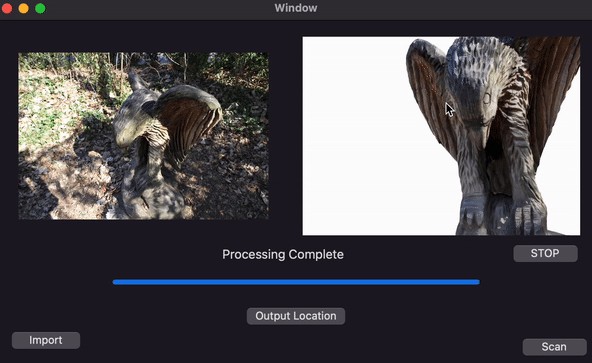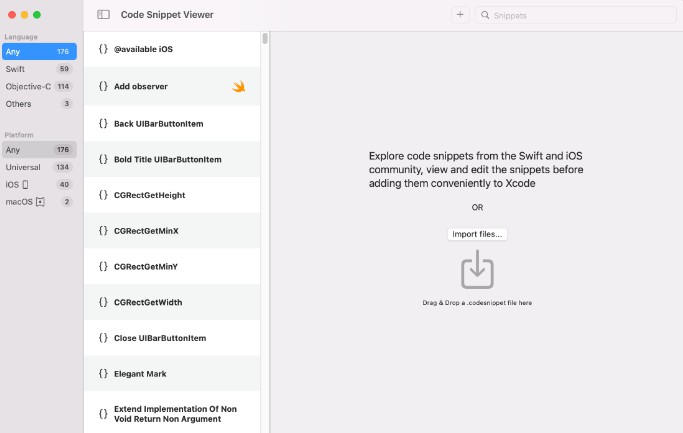Defaults
Swifty and modern UserDefaults
Store key-value pairs persistently across launches of your app.
It uses NSUserDefaults underneath but exposes a type-safe facade with lots of nice conveniences.
It's used in production by apps like Gifski, Dato, Lungo, Battery Indicator, and HEIC Converter.
For a real-world example, see the Plash app.
Highlights
- Strongly typed: You declare the type and default value upfront.
- Codable support: You can store any Codable value, like an enum.
- NSSecureCoding support: You can store any NSSecureCoding value.
- SwiftUI: Property wrapper that updates the view when the
UserDefaultsvalue changes. - Publishers: Combine publishers built-in.
- Observation: Observe changes to keys.
- Debuggable: The data is stored as JSON-serialized values.
- Customizable: You can serialize and deserialize your own type in your own way.
Compatibility
- macOS 10.13+
- iOS 12+
- tvOS 12+
- watchOS 5+
Sindre‘s open source work is supported by the community
Special thanks to:Migration Guides
From v4 to v5
Install
Add https://github.com/sindresorhus/Defaults in the “Swift Package Manager” tab in Xcode.
Support types
Int(8/16/32/64)UInt(8/16/32/64)DoubleCGFloatFloatStringBoolDateDataURLNSColor(macOS)UIColor(iOS)Color(SwiftUI)CodableNSSecureCoding
Defaults also support the above types wrapped in Array, Set, Dictionary, and even wrapped in nested types. For example, [[String: Set<[String: Int]>]].
For more types, see the enum example, Codable example, or advanced Usage. For more examples, see Tests/DefaultsTests.
You can easily add support for any custom type.
If a type conforms to both NSSecureCoding and Codable, then Codable will be used for the serialization.
Usage
You declare the defaults keys upfront with type and default value.
import Cocoa
import Defaults
extension Defaults.Keys {
static let quality = Key<Double>("quality", default: 0.8)
// ^ ^ ^ ^
// Key Type UserDefaults name Default value
}
You can then access it as a subscript on the Defaults global:
Defaults[.quality]
//=> 0.8
Defaults[.quality] = 0.5
//=> 0.5
Defaults[.quality] += 0.1
//=> 0.6
Defaults[.quality] = "?"
//=> [Cannot assign value of type 'String' to type 'Double']
You can also declare optional keys for when you don't want to declare a default value upfront:
extension Defaults.Keys {
static let name = Key<Double?>("name")
}
if let name = Defaults[.name] {
print(name)
}
The default value is then nil.
Enum example
enum DurationKeys: String, Defaults.Serializable {
case tenMinutes = "10 Minutes"
case halfHour = "30 Minutes"
case oneHour = "1 Hour"
}
extension Defaults.Keys {
static let defaultDuration = Key<DurationKeys>("defaultDuration", default: .oneHour)
}
Defaults[.defaultDuration].rawValue
//=> "1 Hour"
(This works as long as the raw value of the enum is any of the supported types)
Codable example
struct User: Codable, Defaults.Serializable {
let name: String
let age: String
}
extension Defaults.Keys {
static let user = Key<User>("user", default: .init(name: "Hello", age: "24"))
}
Defaults[.user].name
//=> "Hello"
Use keys directly
You are not required to attach keys to Defaults.Keys.
let isUnicorn = Defaults.Key<Bool>("isUnicorn", default: true)
Defaults[isUnicorn]
//=> true
SwiftUI support
@Default
You can use the @Default property wrapper to get/set a Defaults item and also have the view be updated when the value changes. This is similar to @State.
extension Defaults.Keys {
static let hasUnicorn = Key<Bool>("hasUnicorn", default: false)
}
struct ContentView: View {
@Default(.hasUnicorn) var hasUnicorn
var body: some View {
Text("Has Unicorn: \(hasUnicorn)")
Toggle("Toggle", isOn: $hasUnicorn)
Button("Reset") {
_hasUnicorn.reset()
}
}
}
Note that it's @Default, not @Defaults.
You cannot use @Default in an ObservableObject. It's meant to be used in a View.
Toggle
There's also a SwiftUI.Toggle wrapper that makes it easier to create a toggle based on a Defaults key with a Bool value.
extension Defaults.Keys {
static let showAllDayEvents = Key<Bool>("showAllDayEvents", default: false)
}
struct ShowAllDayEventsSetting: View {
var body: some View {
Defaults.Toggle("Show All-Day Events", key: .showAllDayEvents)
}
}
You can also listen to changes:
struct ShowAllDayEventsSetting: View {
var body: some View {
Defaults.Toggle("Show All-Day Events", key: .showAllDayEvents)
// Note that this has to be directly attached to `Defaults.Toggle`. It's not `View#onChange()`.
.onChange {
print("Value", $0)
}
}
}
Requires at least macOS 11, iOS 14, tvOS 14, watchOS 7.
Observe changes to a key
extension Defaults.Keys {
static let isUnicornMode = Key<Bool>("isUnicornMode", default: false)
}
let observer = Defaults.observe(.isUnicornMode) { change in
// Initial event
print(change.oldValue)
//=> false
print(change.newValue)
//=> false
// First actual event
print(change.oldValue)
//=> false
print(change.newValue)
//=> true
}
Defaults[.isUnicornMode] = true
In contrast to the native UserDefaults key observation, here you receive a strongly-typed change object.
There is also an observation API using the Combine framework, exposing a Publisher for key changes:
let publisher = Defaults.publisher(.isUnicornMode)
let cancellable = publisher.sink { change in
// Initial event
print(change.oldValue)
//=> false
print(change.newValue)
//=> false
// First actual event
print(change.oldValue)
//=> false
print(change.newValue)
//=> true
}
Defaults[.isUnicornMode] = true
// To invalidate the observation.
cancellable.cancel()
Invalidate observations automatically
extension Defaults.Keys {
static let isUnicornMode = Key<Bool>("isUnicornMode", default: false)
}
final class Foo {
init() {
Defaults.observe(.isUnicornMode) { change in
print(change.oldValue)
print(change.newValue)
}.tieToLifetime(of: self)
}
}
Defaults[.isUnicornMode] = true
The observation will be valid until self is deinitialized.
Reset keys to their default values
extension Defaults.Keys {
static let isUnicornMode = Key<Bool>("isUnicornMode", default: false)
}
Defaults[.isUnicornMode] = true
//=> true
Defaults.reset(.isUnicornMode)
Defaults[.isUnicornMode]
//=> false
This works for a Key with an optional too, which will be reset back to nil.
Control propagation of change events
Changes made within the Defaults.withoutPropagation closure will not be propagated to observation callbacks (Defaults.observe() or Defaults.publisher()), and therefore could prevent infinite recursion.
let observer = Defaults.observe(keys: .key1, .key2) {
// …
Defaults.withoutPropagation {
// Update `.key1` without propagating the change to listeners.
Defaults[.key1] = 11
}
// This will be propagated.
Defaults[.someKey] = true
}
It's just UserDefaults with sugar
This works too:
extension Defaults.Keys {
static let isUnicorn = Key<Bool>("isUnicorn", default: true)
}
UserDefaults.standard[.isUnicorn]
//=> true
Shared UserDefaults
let extensionDefaults = UserDefaults(suiteName: "com.unicorn.app")!
extension Defaults.Keys {
static let isUnicorn = Key<Bool>("isUnicorn", default: true, suite: extensionDefaults)
}
Defaults[.isUnicorn]
//=> true
// Or
extensionDefaults[.isUnicorn]
//=> true
Default values are registered with UserDefaults
When you create a Defaults.Key, it automatically registers the default value with normal UserDefaults. This means you can make use of the default value in, for example, bindings in Interface Builder.
extension Defaults.Keys {
static let isUnicornMode = Key<Bool>("isUnicornMode", default: true)
}
print(UserDefaults.standard.bool(forKey: Defaults.Keys.isUnicornMode.name))
//=> true
API
Defaults
Defaults.Keys
Type: class
Stores the keys.
Defaults.Key (alias Defaults.Keys.Key)
Defaults.Key<T>(_ key: String, default: T, suite: UserDefaults = .standard)
Type: class
Create a key with a default value.
The default value is written to the actual UserDefaults and can be used elsewhere. For example, with a Interface Builder binding.
Defaults.Serializable
public protocol DefaultsSerializable {
typealias Value = Bridge.Value
typealias Serializable = Bridge.Serializable
associatedtype Bridge: Defaults.Bridge
static var bridge: Bridge { get }
}
Type: protocol
Types that conform to this protocol can be used with Defaults.
The type should have a static variable bridge which should reference an instance of a type that conforms to Defaults.Bridge.
Defaults.Bridge
public protocol DefaultsBridge {
associatedtype Value
associatedtype Serializable
func serialize(_ value: Value?) -> Serializable?
func deserialize(_ object: Serializable?) -> Value?
}
Type: protocol
A Bridge is responsible for serialization and deserialization.
It has two associated types Value and Serializable.
Value: The type you want to use.Serializable: The type stored inUserDefaults.serialize: Executed before storing to theUserDefaults.deserialize: Executed after retrieving its value from theUserDefaults.
Defaults.AnySerializable
Defaults.AnySerializable<Value: Defaults.Serializable>(_ value: Value)
Type: class
Type-erased wrapper for Defaults.Serializable values.
get<Value: Defaults.Serializable>() -> Value?: Retrieve the value which type isValuefrom UserDefaults.get<Value: Defaults.Serializable>(_: Value.Type) -> Value?: Specify theValueyou want to retrieve. This can be useful in some ambiguous cases.set<Value: Defaults.Serializable>(_ newValue: Value): Set a new value forDefaults.AnySerializable.
Defaults.reset(keys…)
Type: func
Reset the given keys back to their default values.
You can also specify string keys, which can be useful if you need to store some keys in a collection, as it's not possible to store Defaults.Key in a collection because it's generic.
Defaults.observe
Defaults.observe<T: Codable>(
_ key: Defaults.Key<T>,
options: ObservationOptions = [.initial],
handler: @escaping (KeyChange<T>) -> Void
) -> Defaults.Observation
Type: func
Observe changes to a key or an optional key.
By default, it will also trigger an initial event on creation. This can be useful for setting default values on controls. You can override this behavior with the options argument.
Defaults.observe(keys: keys..., options:)
Type: func
Observe multiple keys of any type, but without any information about the changes.
Options are the same as in .observe(…) for a single key.
Defaults.publisher(_ key:, options:)
Defaults.publisher<T: Codable>(
_ key: Defaults.Key<T>,
options: ObservationOptions = [.initial]
) -> AnyPublisher<KeyChange<T>, Never>
Type: func
Observation API using Publisher from the Combine framework.
Available on macOS 10.15+, iOS 13.0+, tvOS 13.0+, and watchOS 6.0+.
Defaults.publisher(keys: keys…, options:)
Type: func
Combine observation API for multiple key observation, but without specific information about changes.
Available on macOS 10.15+, iOS 13.0+, tvOS 13.0+, and watchOS 6.0+.
Defaults.removeAll
Defaults.removeAll(suite: UserDefaults = .standard)
Type: func
Remove all entries from the given UserDefaults suite.
Defaults.Observation
Type: protocol
Represents an observation of a defaults key.
Defaults.Observation#invalidate
Defaults.Observation#invalidate()
Type: func
Invalidate the observation.
Defaults.Observation#tieToLifetime
@discardableResult
Defaults.Observation#tieToLifetime(of weaklyHeldObject: AnyObject) -> Self
Type: func
Keep the observation alive for as long as, and no longer than, another object exists.
When weaklyHeldObject is deinitialized, the observation is invalidated automatically.
Defaults.Observation.removeLifetimeTie
Defaults.Observation#removeLifetimeTie()
Type: func
Break the lifetime tie created by tieToLifetime(of:), if one exists.
The effects of any call to tieToLifetime(of:) are reversed. Note however that if the tied-to object has already died, then the observation is already invalid and this method has no logical effect.
Defaults.withoutPropagation(_ closure:)
Execute the closure without triggering change events.
Any Defaults key changes made within the closure will not propagate to Defaults event listeners (Defaults.observe() and Defaults.publisher()). This can be useful to prevent infinite recursion when you want to change a key in the callback listening to changes for the same key.
Defaults.migrate(keys..., to: Version)
Defaults.migrate<T: Defaults.Serializable & Codable>(keys..., to: Version)
Defaults.migrate<T: Defaults.NativeType>(keys..., to: Version)
Type: func
Migrate the given keys to the specific version.
@Default(_ key:)
Get/set a Defaults item and also have the SwiftUI view be updated when the value changes.
Advanced
Defaults.CollectionSerializable
public protocol DefaultsCollectionSerializable: Collection, Defaults.Serializable {
init(_ elements: [Element])
}
Type: protocol
A Collection which can store into the native UserDefaults.
It should have an initializer init(_ elements: [Element]) to let Defaults do the de-serialization.
Defaults.SetAlgebraSerializable
public protocol DefaultsSetAlgebraSerializable: SetAlgebra, Defaults.Serializable {
func toArray() -> [Element]
}
Type: protocol
A SetAlgebra which can store into the native UserDefaults.
It should have a function func toArray() -> [Element] to let Defaults do the serialization.
Advanced usage
Custom types
Although Defaults already has built-in support for many types, you might need to be able to use your own custom type. The below guide will show you how to make your own custom type work with Defaults.
- Create your own custom type.
struct User {
let name: String
let age: String
}
- Create a bridge that conforms to
Defaults.Bridge, which is responsible for handling serialization and deserialization.
struct UserBridge: Defaults.Bridge {
typealias Value = User
typealias Serializable = [String: String]
public func serialize(_ value: Value?) -> Serializable? {
guard let value = value else {
return nil
}
return [
"name": value.name,
"age": value.age
]
}
public func deserialize(_ object: Serializable?) -> Value? {
guard
let object = object,
let name = object["name"],
let age = object["age"]
else {
return nil
}
return User(
name: name,
age: age
)
}
}
- Create an extension of
Userthat conforms toDefaults.Serializable. Its static bridge should be the bridge we created above.
struct User {
let name: String
let age: String
}
extension User: Defaults.Serializable {
static let bridge = UserBridge()
}
- Create some keys and enjoy it.
extension Defaults.Keys {
static let user = Defaults.Key<User>("user", default: User(name: "Hello", age: "24"))
static let arrayUser = Defaults.Key<[User]>("arrayUser", default: [User(name: "Hello", age: "24")])
static let setUser = Defaults.Key<Set<User>>("user", default: Set([User(name: "Hello", age: "24")]))
static let dictionaryUser = Defaults.Key<[String: User]>("dictionaryUser", default: ["user": User(name: "Hello", age: "24")])
}
Defaults[.user].name //=> "Hello"
Defaults[.arrayUser][0].name //=> "Hello"
Defaults[.setUser].first?.name //=> "Hello"
Defaults[.dictionaryUser]["user"]?.name //=> "Hello"
Dynamic value
There might be situations where you want to use [String: Any] directly, but Defaults need its values to conform to Defaults.Serializable. The type-eraser Defaults.AnySerializable helps overcome this limitation.
Defaults.AnySerializable is only available for values that conform to Defaults.Serializable.
Warning: The type-eraser should only be used when there's no other way to handle it because it has much worse performance. It should only be used in wrapped types. For example, wrapped in Array, Set or Dictionary.
Primitive type
Defaults.AnySerializable conforms to ExpressibleByStringLiteral, ExpressibleByIntegerLiteral, ExpressibleByFloatLiteral, ExpressibleByBooleanLiteral, ExpressibleByNilLiteral, ExpressibleByArrayLiteral, and ExpressibleByDictionaryLiteral.
Which means you can assign these primitive types directly:
let any = Defaults.Key<Defaults.AnySerializable>("anyKey", default: 1)
Defaults[any] = "?"
Other types
Using get and set
For other types, you will have to assign it like this:
enum mime: String, Defaults.Serializable {
case JSON = "application/json"
case STREAM = "application/octet-stream"
}
let any = Defaults.Key<Defaults.AnySerializable>("anyKey", default: [Defaults.AnySerializable(mime.JSON)])
if let mimeType: mime = Defaults[any].get() {
print(mimeType.rawValue)
//=> "application/json"
}
Defaults[any].set(mime.STREAM)
if let mimeType: mime = Defaults[any].get() {
print(mimeType.rawValue)
//=> "application/octet-stream"
}
Wrapped in Array, Set, or Dictionary
Defaults.AnySerializable also support the above types wrapped in Array, Set, Dictionary.
Here is the example for [String: Defaults.AnySerializable]:
extension Defaults.Keys {
static let magic = Key<[String: Defaults.AnySerializable]>("magic", default: [:])
}
enum mime: String, Defaults.Serializable {
case JSON = "application/json"
}
// …
Defaults[.magic]["unicorn"] = "?"
if let value: String = Defaults[.magic]["unicorn"]?.get() {
print(value)
//=> "?"
}
Defaults[.magic]["number"] = 3
Defaults[.magic]["boolean"] = true
Defaults[.magic]["enum"] = Defaults.AnySerializable(mime.JSON)
if let mimeType: mime = Defaults[.magic]["enum"]?.get() {
print(mimeType.rawValue)
//=> "application/json"
}
For more examples, see Tests/DefaultsAnySerializableTests.
Serialization for ambiguous Codable type
You may have a type that conforms to Codable & NSSecureCoding or a Codable & RawRepresentable enum. By default, Defaults will prefer the Codable conformance and use the CodableBridge to serialize it into a JSON string. If you want to serialize it as a NSSecureCoding data or use the raw value of the RawRepresentable enum, you can conform to Defaults.PreferNSSecureCoding or Defaults.PreferRawRepresentable to override the default bridge:
enum mime: String, Codable, Defaults.Serializable, Defaults.PreferRawRepresentable {
case JSON = "application/json"
}
extension Defaults.Keys {
static let magic = Key<[String: Defaults.AnySerializable]>("magic", default: [:])
}
print(UserDefaults.standard.string(forKey: "magic"))
//=> application/json
Had we not added Defaults.PreferRawRepresentable, the stored representation would have been "application/json" instead of application/json.
This can also be useful if you conform a type you don't control to Defaults.Serializable as the type could receive Codable conformance at any time and then the stored representation would change, which could make the value unreadable. By explicitly defining which bridge to use, you ensure the stored representation will always stay the same.
Custom Collection type
- Create your
Collectionand make its elements conform toDefaults.Serializable.
struct Bag<Element: Defaults.Serializable>: Collection {
var items: [Element]
var startIndex: Int { items.startIndex }
var endIndex: Int { items.endIndex }
mutating func insert(element: Element, at: Int) {
items.insert(element, at: at)
}
func index(after index: Int) -> Int {
items.index(after: index)
}
subscript(position: Int) -> Element {
items[position]
}
}
- Create an extension of
Bagthat conforms toDefaults.CollectionSerializable.
extension Bag: Defaults.CollectionSerializable {
init(_ elements: [Element]) {
self.items = elements
}
}
- Create some keys and enjoy it.
extension Defaults.Keys {
static let stringBag = Key<Bag<String>>("stringBag", default: Bag(["Hello", "World!"]))
}
Defaults[.stringBag][0] //=> "Hello"
Defaults[.stringBag][1] //=> "World!"
Custom SetAlgebra type
- Create your
SetAlgebraand make its elements conform toDefaults.Serializable & Hashable
struct SetBag<Element: Defaults.Serializable & Hashable>: SetAlgebra {
var store = Set<Element>()
init() {}
init(_ store: Set<Element>) {
self.store = store
}
func contains(_ member: Element) -> Bool {
store.contains(member)
}
func union(_ other: SetBag) -> SetBag {
SetBag(store.union(other.store))
}
func intersection(_ other: SetBag) -> SetBag {
var setBag = SetBag()
setBag.store = store.intersection(other.store)
return setBag
}
func symmetricDifference(_ other: SetBag) -> SetBag {
var setBag = SetBag()
setBag.store = store.symmetricDifference(other.store)
return setBag
}
@discardableResult
mutating func insert(_ newMember: Element) -> (inserted: Bool, memberAfterInsert: Element) {
store.insert(newMember)
}
mutating func remove(_ member: Element) -> Element? {
store.remove(member)
}
mutating func update(with newMember: Element) -> Element? {
store.update(with: newMember)
}
mutating func formUnion(_ other: SetBag) {
store.formUnion(other.store)
}
mutating func formSymmetricDifference(_ other: SetBag) {
store.formSymmetricDifference(other.store)
}
mutating func formIntersection(_ other: SetBag) {
store.formIntersection(other.store)
}
}
- Create an extension of
SetBagthat conforms toDefaults.SetAlgebraSerializable
extension SetBag: Defaults.SetAlgebraSerializable {
func toArray() -> [Element] {
Array(store)
}
}
- Create some keys and enjoy it.
extension Defaults.Keys {
static let stringSet = Key<SetBag<String>>("stringSet", default: SetBag(["Hello", "World!"]))
}
Defaults[.stringSet].contains("Hello") //=> true
Defaults[.stringSet].contains("World!") //=> true
FAQ
How can I store a dictionary of arbitrary values?
After Defaults v5, you don't need to use Codable to store dictionary, Defaults supports storing dictionary natively.
For Defaults support types, see Support types.
How is this different from SwiftyUserDefaults?
It's inspired by that package and other solutions. The main difference is that this module doesn't hardcode the default values and comes with Codable support.
Maintainers
Related
- Preferences - Add a preferences window to your macOS app
- KeyboardShortcuts - Add user-customizable global keyboard shortcuts to your macOS app
- LaunchAtLogin - Add "Launch at Login" functionality to your macOS app
- Regex - Swifty regular expressions
- DockProgress - Show progress in your app's Dock icon
- Gifski - Convert videos to high-quality GIFs on your Mac
- More…


